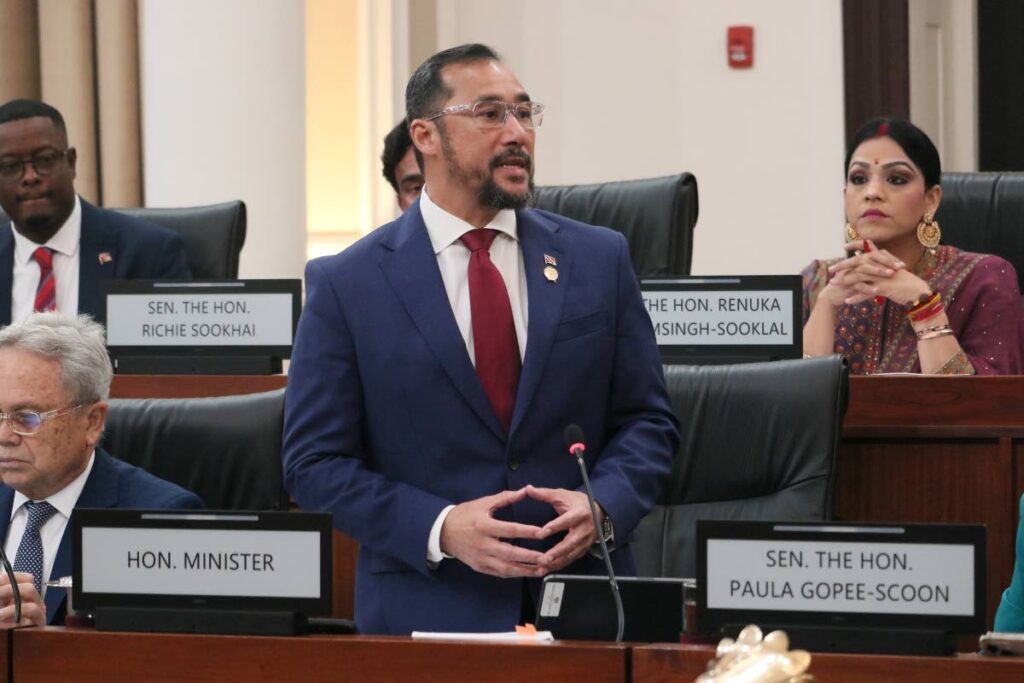Young: Refineries being closed globally

Acting PM Stuart Young said refineries are closing globally as leaders decide there is no money in refining.
He made the statement during the budget debate in the Senate on October 23.
“It was two days ago, I was speaking to one of the global leaders in oil and gas players and they were telling me of the difficulty they are having and how they are considering shutting down some of the state-of-the-art refineries they have, for example, in India.
“They described to me because of the technology being used there, it is possible to eat your sandwich off the plant floor, it is so clean what is being produced. Our refinery is not a state-of-the-art refinery, and they said the margins have shrunk so much, there is no money in refinery business any more. They are one of the world’s leading producers of oil.”
He said an article from global energy publication Oilprice.com on March 28, with the headline Over 20 Per Cent of the World’s Oil Refining Capacity Is at Risk of Closure, stated that weakening refinery margins and carbon taxes put a fifth of global refining capacity at risk.
“Europe and China face the highest closure risk due to declining demand and environmental regulations. The rise of electric vehicles and biofuels is transforming the industry, potentially leading to widespread refinery closures,” the article said. It also said more than 20 per cent of the total global refining capacity was at risk of closure.
Young said this was a global problem in the energy sector, of which TT is a small player.
“The outcome of what I’ve just said, and what I am telling the population without fear of contradiction, is that the refining business is an extremely difficult one, even with a source of crude that you yourself are producing and have some control over the price, as well as with the most technologically advanced refineries in the world, which unfortunately ours in TT is not.”
Young said these were some of the contributing factors which led to the difficult decision to mothball the Petrotrin refinery.
“Petrotrin may have been a net foreign exchange earner when barrels of oil were being produced in TT at 150,000 or even up to 178,000 barrels of oil per day, but the truth is, it is not.
“It was experiencing significant losses because it was an older refinery and because we had to purchase the vast majority of crude. We had to be buying over 100,000 barrels of oil a day. If you use a price of US$75 of oil, work the math, that had to be paid in US dollars, US$7.5 million a day, to put crude oil into an outdated refinery.
He said the refinery became financially unfeasible and faced significant losses that threatened TT’s economic existence.
He said in 2011, Petrotrin was making a profit, which had dropped by 50 per cent to $1 billion in 2012. He said in 2013 it made only $15 million profit and made a loss of $200 million in 2014. He said by 2018, the company made a loss of $16.4 billion.
Young told the population not to consider the promises made by the opposition to bring back the refinery if they came back into power.
He said after the government shut down the refinery, it wanted to be able to restart it without cost to taxpayers. He said there had been several attempts, starting in 2018-2019. He said people worldwide have shown interest in restarting the refinery.
“In 2023/2024, we continued to receive unsolicited expressions of interest. We narrowed it down to ten and then opened it back up because we were still evaluating. Three more people came in, including the famous Jindal Steel and Power, Jomore International and BB Energy, as well as SARS Enterprises.”
He said Cabinet appointed an evaluation committee that brought the number down to three companies: CRO Consortium, Inca Energy LLC and Oando PLC.
“Unfortunately, as is the modus operandi of the irresponsible people in our society, attacks on international potential operators does affect them because their brand is important. What we heard here in the House and the population from Senator Mark from his contribution this week is a complete figment of someone’s imaginations.”
Young said he asked for complete due diligence on ChemiTech, D Rampersad and Company Ltd and Ocala Services Ltd. He said a consortium does not, in law, become a registered, incorporated consortium. He said it is really a gathering of legally incorporated companies.
“The only one incorporated in TT is D Rampersad and Company and the directors and shareholders of that company are well known to those on the other side. It is a local entity operating in TT for almost 50 years. “ChemiTech is an engineering, procurement and construction company, headquartered in the United Arab Emirates. In all of these companies, none have a link to Jindal.”
Young said another ridiculous claim was that one of the companies was sanctioned by the US Office of Foreign Assets Control (OFAC).
He said he had checked the list, dated October 17, and none of these companies, including parents and subsidiaries, were on the list.
“All of these things are done to affect the psyche of the people of TT and mislead them. I am pleading with those who really care about TT: do not try to scuttle the government’s attempt to restart the refinery. Do not attack any individual who doesn’t fit your narrative.
“A responsible government, and even those who think they’re governments in waiting, would want what is best for TT.”

Comments
"Young: Refineries being closed globally"